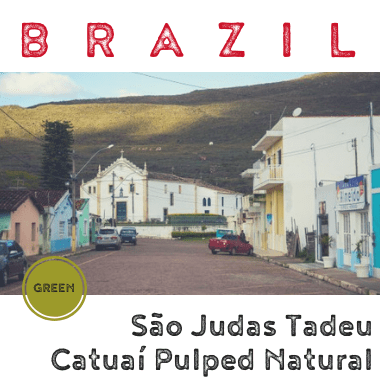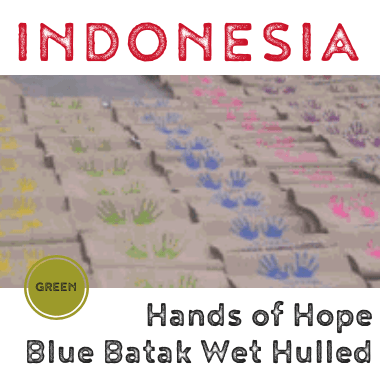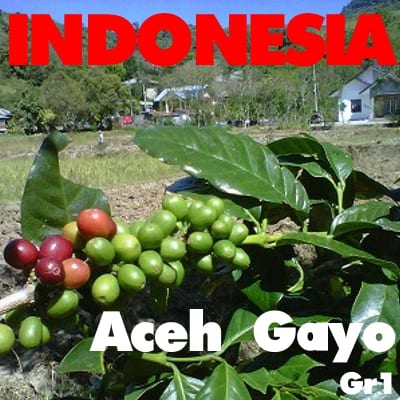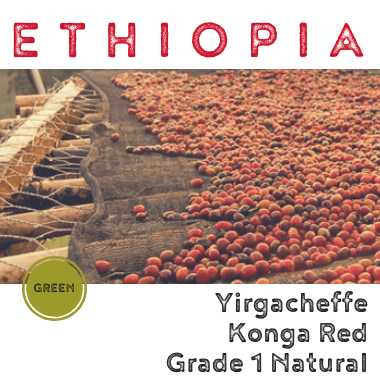Description
STATE: Bahia
REGION: Chapada Diamantina
TOWN: Piatã
ALTITUDE: 1,300 – 1,380m above sea level
VARIETAL: Catuaí
PROCESSING: Pulped Natural
FARM: São Judas Tadeu
OWNER: Antonio and Terezinha Rigno de Oliveira (awards Cup of Excellence 2008, 2009, 2010, 2011, 2014, 2015, and 2016)
In the cup: Complex, floral fragrance with brown sugar, cherry and chocolate mousse in the cup. Marmalade sweetness and a creamy body.
Fazenda São Judas Tadeu lies outside the small town of Piatã in Bahia’s Chapada Diamantina region, at an altitude of 1,300 to 1,380 metres above sea level. Chapada Diamantina translates to ”Diamond Plateau” in Portuguese, and for 100 years this area was mined for the gemstones embedded in its cliffs. Today the region is famous for its specialty coffee.
Piatã is a very unique and privileged coffee growing region in Brazil, with high altitudes and temperatures that vary from 2°C to 18°C in the winter. These factors, combined with the area’s rich soil and growing conditions, present favourable conditions for producing high quality coffee with a cup profile that is very bright, transparent, and distinctive. This region has only recently started to become recognised internationally for its high quality since the 2009 Cup of Excellence, where five of the top 10 spots came from Piatã. The region’s dominance in the awards has continued every year since and incredibly, in the 2016 Cup of Excellence Pulped Natural competition, an astounding 19 of the 24 winning lots came from Piatã!
Fazenda São Judas Tadeu is owned and managed by Antonio Rigno and his wife Terezinha, who have been farming coffee in the region for more than 40 years. Antonio owns a number of farms in Piatã and is very well respected in the community, with many farmers in the area looking to him for advice and mentorship as well as processing their coffee at his wet mill located at São Judas. Sharing his knowledge and expertise gives him great a great sense of purpose and pride. “There are no secrets” he explained. “Here, the people in Piata are like my family. I want to help them produce great coffee. It’s my duty, and my joy”. Over the course of the last decade, Antonio has worked closely with his neighbours and surrounding community to institute improved agricultural practices to improve quality. Antonio also regularly brings the coffee community together at the town’s clubhouse and also runs a café in town with Terezinha.
Antonio’s coffees have placed in Bahia’s state-sponsored Coffee Quality Competition many times, including winning 1st place in the first 3 consecutive years the competition was ever run (2004 – 2007). He also has countless Cup of Excellence awards. In 2014, it placed 2nd (with a score of 93.65 points) and in 2015, it placed 1st (with a score of 91.22)
Fazenda São Judas extends over 35 hectares, of which 15 are under coffee. The farm is mainly planted out with Catuaí varietal trees, although Antônio is also trialling some Bourbon trees and will continue planting these if his trial is a success.
Antônio tries to farm in as sustainable a way as possible, keeping his use of chemical pesticides to a minimum and recycling coffee pulp to use as fertiliser. Gravelas trees provide shade throughout the coffee plantation, and the rest of the farm is covered by natural forest, which Antônio both protects and extends by regularly planting trees. He has also invested in modern processing facilities, including a wet mill and both conventional and covered patios.
Antônio looks after and rewards his workers, providing them with job security and good working conditions and sharing the fruits of his success—after the win in the 2011 Cup of Excellence, he purchased a motorcycle for each of his full-time employees. Most of his staff have been with him for over 20 years. “They are like family, and care as much as I do about quality” he explained. “I am very lucky”.
HOW THIS COFFEE WAS PROCESSED
Antônio ensures cherries are picked by hand only when fully ripe, with two passes a day during the peak of the harvest. This job is mainly conducted by women who are extremely disciplined and ensure only the very best cherries are selected. The cherries are then taken by tractors to the wet mill (located right on the farm). A dedicated team of ten process the coffee at the mill with great care. “We treat every single lot like it has the potential to be a 90+ coffee” he explained.
This coffee has been processed using the pulped natural process. After pulping the beans are then sun-dried on patios with their mucilage still attached—spread in layers of about four centimetres and raked several times a day. Finally, the beans are separated into numbered lots which are stored and rested in parchment in a purpose-built warehouse, and then cupped for quality control prior to export.
Great care is required in order to produce coffee of the quality that São Judas Tadeu consistently produces, from preparing the land appropriately, growing and planting seedlings, all the way through to processing. Antônio ensures that his processes are reviewed and guided annually by technicians from AGRIPEC, an agricultural support community, and is highly attentive to new technologies or methods that will improve quality.
(Information courtesy of Melbourne Coffee Merchants – MCM)






Reviews
There are no reviews yet.